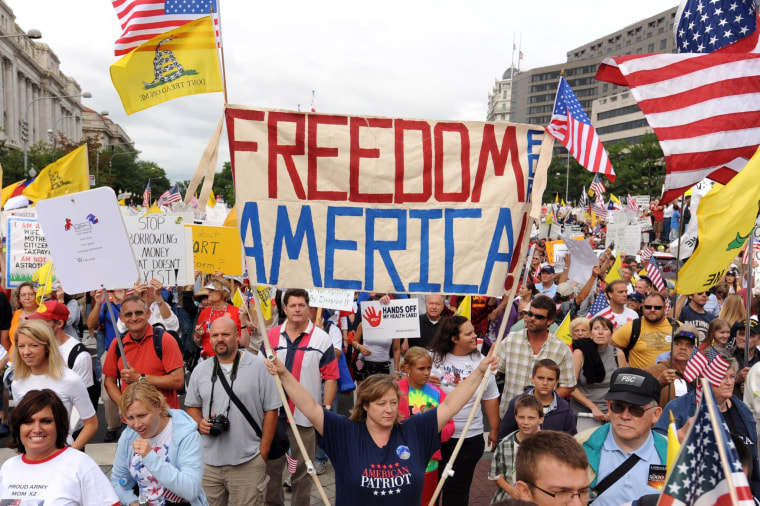For the most part, President Joe Biden has begun his term as a relatively popular leader. FiveThirtyEight's averages of the latest national surveys show the Democrat with a 54% approval rating -- a level of support his immediate predecessor never reached during his White House tenure.
In theory, Biden's support would be even higher, but in a time of intense political polarization, so many Republican voters reflexively oppose a Democratic president that more robust poll numbers are nearly impossible. That said, as HuffPost noted in an interesting item, "a mass movement in opposition" to Biden simply hasn't materialized yet.
At this point in his presidency, Obama faced the Tea Party revolt. On April 15, 2009 ― Tax Day ― thousands of protesters took to the streets in cities across the U.S. to demonstrate against high taxes and increased government spending following the Great Recession. In Washington, D.C., a crowd even forced a temporary shutdown of the White House after they hurled tea bags onto the executive mansion's lawn. Republicans insist the same type of backlash is coming for Biden if he continues down the path he's on.
Maybe. But it's worth pausing to appreciate the qualitative and quantitative differences between 2021 and 2009.
NBC News has been conducting national polling for many years, asking Americans whether they believe government should be doing more to solve problems, or whether they believe government is doing too many things that should be left to the private sector and individuals. In the mid-1990s -- around the time then-President Bill Clinton said the "era of big government is over" -- most of the public said it wanted the public sector to do less, not more.
At this point 12 years ago, meanwhile, NBC News found the public largely divided on the issue -- 47% wanted government to do more, while 46% wanted the opposite -- and in the months that followed, opponents of government activism gradually built an enduring advantage.
But in the latest national poll, released last week, NBC News found 55% of the public wants government to do more, not less. This is hardly the basis for a Tea Party-style backlash.
Similarly, Gallup released a report in March that explained, "The latest update shows that 54% of Americans say the government should do more to solve our country's problems, while 41% say the government is trying to do too many things that should be left to individuals and businesses. This is the highest percentage choosing the 'government should do more option since Gallup began asking the question in 1992."
It's against this backdrop that the latest surveys pointed to roughly two-thirds support for the White House's American Relief Plan, American Jobs Plan, and American Families Plan.
Republicans may be waiting for a broad national backlash to Biden's popular proposals, but given public attitudes, such a reaction appears unlikely to grow organically.

